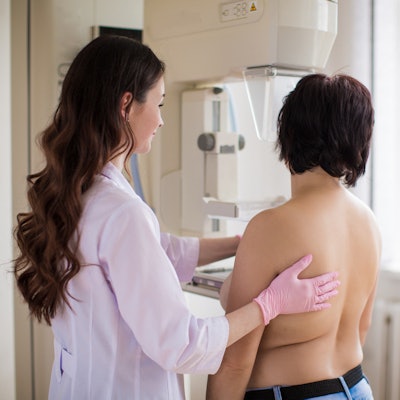
Despite widespread use of breast density notifications, many women are uncertain about or overstate the role of breast density in cancer risk, according to survey results published January 23 in JAMA Network Open.
A team led by Laura Beidler from Dartmouth College found that about half of women who undergo mammography screening thought that breast density was a greater risk for cancer than not having children, having more than one alcoholic drink per day, or having a prior breast biopsy.
"Radiologists might consider how they can be involved in education about the risk of breast density and other factors, so that women feel informed and empowered to manage their breast cancer risk," corresponding author Christine Gunn, PhD, from Dartmouth College in Hanover, NH, told AuntMinnie.com. "This could mean working with primary care to coordinate and support messaging about risk-aligned imaging options."
Studies have shown that breast density is a risk factor for the development of breast cancer. Although laws among U.S. states vary regarding informing women that they have dense breasts, previous research suggests that women in states that mandate breast density notification are more likely to report having dense breasts.
Beidler and colleagues wanted to assess women's perceptions of breast density compared with other breast cancer risks, as well as their understanding of risk reduction. The group evaluated survey data collected from 1,858 women; many of the participants expressed uncertainty when it came to how much of a cancer risk breast density actually poses.
More than half of the women (52%) thought breast density was a greater cancer risk than not having children, while 53% thought it carried greater risk than having more than one alcoholic drink per day and 48% thought it held a greater risk than having a prior breast biopsy. However, the majority (93%) of respondents felt that breast density was a lesser cancer risk than having a first-degree relative with breast cancer, while 65% thought it was a lesser risk than being overweight or obese.
The researchers also interviewed 61 women. Out of these, 43 emphasized family history as a breast cancer risk factor while six reported breast density as "contributing" to cancer risk. Seventeen indicated they did not know whether it was possible to reduce their breast cancer risk.
Gunn told AuntMinnie.com that it is important to support women undergoing mammography in understanding their overall risk. She also said that using clear, plain language is needed to help all women understand the complex concept of breast cancer risk, adding that using breast density as an opening to have conversations with patients about overall risk may be more useful than talking about risk factors in isolation.
"It's not just about breast density, but family history as well as lifestyle factors," she said. "These lifestyle factors are mutable, and more education about what people can do to actively lower their cancer risk is needed."




















